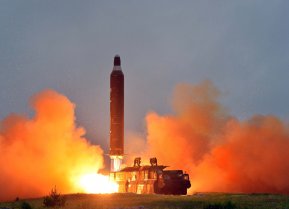Kim Jong-un's 2020 Dilemma: ICBM Test or Do Nothing?
"No deal continues to be Trump’s best option and the one he is most likely to be content with. Pyongyang’s best course of action in the months leading up to the U.S. election, therefore, is to do nothing."
Kim Jong-un is currently facing a dilemma. After a few weeks of (over)attention due to his unexplained absence from public view, he is once again largely being overlooked. While the North Korean leader doesn’t mind being hated, he hates to be ignored.
It’s hard to imagine Kim keeping a low profile between now and the November U.S. presidential elections, but it’s not clear what he can do between now and then to persuade Washington to be more forthcoming than it has already been. Maintaining the status quo – no peace, no war, no deals – may be the best he can hope for, but this runs contrary to his normal default position, which is to rock the boat until someone rewards him to stop being disruptive.
In the past, Kim Jong-un – like his father and grandfather before him – has had an inflated view of his nation’s global importance. The media frenzy surrounding Kim’s recent unusual (but not unprecedented) public absence reinforces this view. But, Kim’s “bromance” with President Trump notwithstanding, who is in charge in Pyongyang matters little from a national security standpoint. Regardless of who sits on the throne in Pyongyang, U.S. objectives remain unchanged: deter the North from military action against the South (or anyone else) and prevent nuclear proliferation.
I was once at an international conference with North Korean colleagues. At the end of the first day’s discussion on major-power competition and confrontation, one of them came to me perplexed: “The DPRK,” he said, “was hardly even referenced today; how could that be?” When I explained that North Korea was not seen as a “major power” and that topics like Sino-U.S. and U.S.-Russia relations were far more significant globally, he was truly shocked. When North Koreans describe themselves as a major nuclear world power on par with China or the former Soviet Union, this is not hyperbole to them; they actually do (and must) believe it.
As a result of this misperception about his nation’s global importance, Kim may think he has some leverage with the U.S. as the U.S. November election approaches, assuming that President Trump may be eager, even desperate, for a “win” to demonstrate his diplomatic prowess. This would be a huge miscalculation on his part. If there is one thing Trump supporters and detractors agree upon when it comes to North Korea, it’s that “no deal is better than a bad deal.” The sound you heard after the “failed” Kim-Trump Hanoi Summit was a huge sigh of relief from both quarters. Any deal Pyongyang is likely to agree upon would no doubt be criticized by both the left and the hardline right (Trump’s base) as a bad one. No deal continues to be Trump’s best option and the one he is most likely to be content with. Pyongyang’s best course of action in the months leading up to the U.S. election, therefore, is to do nothing.
This will not preclude attention-getting actions like more short or medium-range missile tests but will likely preclude an ICBM or nuclear test which would force the U.S. and international community to tighten the screws at a time when all nations, including North Korea, are hunkering down due to the global pandemic. A smarter move would be to wave some olive branches in Seoul’s direction, but Kim seems determined to continue dismissing the peace overtures coming from his southern neighbor.
Ralph Cossa is President Emeritus and WSD-Handa Chair in Peace Studies at the Pacific Forum in Honolulu.


